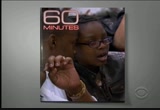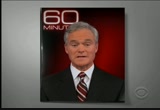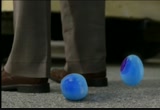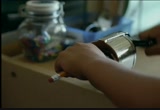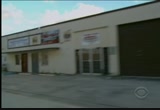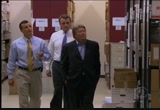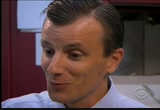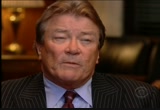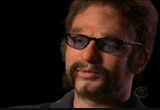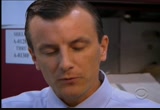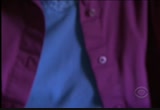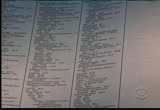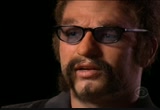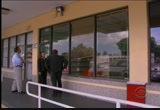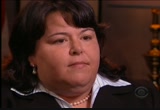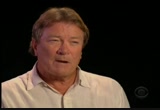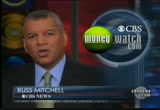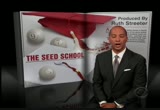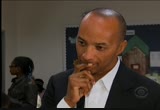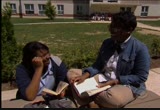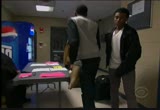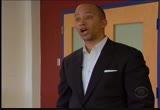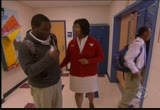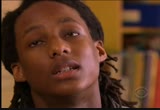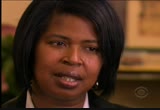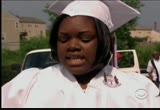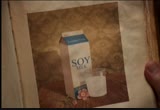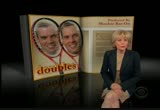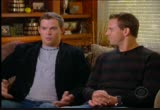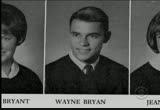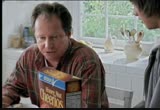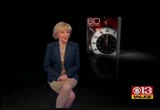tv 60 Minutes CBS September 5, 2010 7:00pm-8:00pm EDT
7:00 pm
captioning funded by cbs and ford-- built for the road ahead. >> kroft: they are agents of the federal government operating out of a secret location in south florida, going after what's become one of the biggest criminal enterprises in america: medicare fraud. is the medicare fraud business bigger than the drug business in miami now? >> i think it's way bigger. >> kroft: it is a quiet crime. the only victims are the american taxpayer, and they don't even know they're being ripped off. how much money did you steal from medicare? >> about $20 million. >> kroft: was it easy? >> real easy.
7:01 pm
>> kroft: and you're not exactly a criminal mastermind. >> no. >> girl 41. ( cheers and applause ) >> pitts: this family was one of the few who won the lottery last year, a $35,000-per-year education paid for by private and government money. >> boy 12. >> pitts: only a third of the over 200 or so kids who applied heard their number called. with a child's future at stake, emotions ran high. >> 38. ( cheers and applause ) >> pitts: why does this mean so much to you? >> it's called opportunity. we've never had that before. here, you know, the sky is the limit. >> stahl: the bryan brothers do everything in sync. you get mesmerized watching, like when they're about to return a shot, or on the sidelines between games, or while practicing here near their home north of los angeles. >> we complement each other really well. i mean, if you put us together,
7:02 pm
we're one really good... >> both: ...complete player. yeah. >> stahl: the bryan boys are what's called "mirror image identical twins." they're number one in the world in doubles, and they celebrate each victory the same way. with over 62 professional titles, their chests may be getting sore. >> i'm steve kroft. >> i'm lesley stahl. >> i'm bob simon. >> i'm morley safer. >> i'm byron pitts. >> i'm scott pelley. those stories tonight on "60 minutes." we should reach our normal high by this afternoon. hey, ellen! what are you doing? not much -- just brewing up some dunkin' donuts coffee. want some? [ whoosh! ] i'd love some. one taste, and you'll understand. delicious dunkin' donuts coffee. mm! good! pick some up where you buy groceries.
7:03 pm
america runs on dunkin'. oh no, no! i just parked here a second ago! give me a break, will you? (announcer) dr. scholl's massaging gel insoles with two different gels for softness and support... ...are outrageously comfortable. ...on second thought, i think i'll walk... (announcer) are you gellin'? dr. scholl's oh, see, this is the back to school list. the cost always makes mom freak. mommy. mom. hey, mom. good times. mom, the back to school list is here. looks expensive. graphing calculator, flash drive, pencils, p-- that was easy. good times. [ male announcer ] get back to school and back to savings
7:05 pm
>> kroft: of all the financial problems facing the united states right now, none imperil the country's future more than soaring budget deficits and the astronomical costs of providing health care to an aging population. and at the center of both of these issues is medicare. as we first reported last fall, the government insurance program pays out a half a trillion dollars each year in medical benefits to 46 million elderly and disabled americans. but it also provides a rich and steady income stream for criminals who are constantly finding new ways to steal a sizable chunk of that money. the justice department claims that medicare fraud is now a $60-billion-a-year industry and has become one of, if not the most profitable crimes in america. we caution you that this story may raise your blood pressure, along with some troubling questions about our government's ability to manage a medical bureaucracy. if you want to find medicare fraud, the first place you
7:06 pm
should look is south florida, where we were told it has pushed aside cocaine as the major criminal enterprise here. it's a quiet crime, no sirens or gunfire. the only victims are the american taxpayers, and they don't even know they are being ripped off. f.b.i. special agent brian waterman, who we rode with for several days, told us the only visible evidence of the crimes are the thousands of tiny clinics and pharmacies that dot the low-rent strip malls. you don't even know they're there because there's never anyone inside-- no doctors, no nurses and no patients. >> brian waterman: this office number should be manned and answered 24 hours a day. >> kroft: this tiny medical supply company billed medicare almost $2 million in july of '09 and a half-million dollars while we were there in august, but we never found anybody in, and our phone calls were never returned. they say they're currently on the other line. >> waterman: oh. well, do they want you to hold?
7:07 pm
>> kroft: sometimes, they don't even have offices. we went looking for a pharmacy at 7511 northwest 73rd street that billed medicare $300,000 in charges. it turned out to be in the middle of a public warehouse storage area. >> waterman: they've already told us that there's no offices here. there are no businesses here. in fact, they are not even allowed to have a business here. >> kroft: waterman is the senior agent in the miami office in charge of medicare fraud. and kirk ogrosky, a top justice department prosecutor, oversees half a dozen medicare fraud strike forces that have been set up across the country. this one operates out of a warehouse at a secret location in south florida, and includes investigators from the f.b.i., health and human services, and the i.r.s. >> waterman: there's a healthcare fraud industry where people do nothing but recruit patients, get patient lists, find doctors, look on the internet, find different scams. there are entire groups and entire organizations of people that are dedicated to nothing but committing fraud, finding a
7:08 pm
better way to steal from medicare. >> kroft: is the medicare fraud business bigger than the drug business in miami now? >> kirk ogrosky: i think it's way bigger. >> kroft: what changed? >> ogrosky: the criminals changed. >> waterman: sophistication. >> ogrosky: they've figured out that, rather than stealing $100,000 or $200,000, they can steal $100 million. we have seen cases in the last six, eight months that involve a couple of guys that, if they weren't stealing from medicare, might be stealing your car. >> waterman: you know, we were the king of the drugs in the '80s. we're king of healthcare fraud in the '90s and the 2000s. >> kroft: but it's not just miami. last year, the f.b.i. arrested 53 people in detroit, including a number of doctors, and charged them with billing medicare more than $50 million for unnecessary medical procedures. and in los angeles, the city of angels medical center recruited homeless people off the street to fill their empty beds, offering them cash and drugs, plus clean sheets and three squares a day, while billing medicare tens of millions of dollars for their stay.
7:09 pm
>> eric holder: we have to understand this is a major fraud area. >> kroft: united states attorney general eric holder is taking a crime that has been in the backwaters of law enforcement and made it a top priority at the justice department. why do you think it's been so attractive for the criminals? >> holder: because i think it's been pretty easy. i think that they have found a way in which they have been able to get pretty substantial amounts of money with not a huge amount of effort and, at least until now, without the possibility of great detection. >> kroft: with much fewer risks... >> holder: much fewer risks. you'll see some of these people, and they'll say, "you know there is not a chance that you are going to have some other drug dealer shooting at you." the chances of being incarcerated were lower, the amount of time that you would spend in jail was smaller. all of which is different now. >> tony: you're waking up every day, making $20,000, $30,000, $40,000-- every day, almost literally. and you're like, "wow, i mean, i just won the lottery." >> kroft: let's call this guy "tony." that's not his real name, and obviously, not his real face.
7:10 pm
but before he was ratted out by a friend and brought down by the f.b.i., he was making wall street money running a string of phony medical supply companies out of this building that were theoretically providing wheelchairs and other expensive equipment to medicare patients. how much money did you steal from medicare? >> tony: about $20 million. >> kroft: $20 million? >> tony: yes. >> kroft: was it easy? >> tony: real easy. >> kroft: and you're not exactly a criminal mastermind? >> tony: no, no. ( laughs ) no, not really. it's more like common sense. that's all you need here. >> kroft: did you actually ever sell any medical equipment? >> tony: no. no. just have somebody in an office answering the phone, like we're open for business. and wake up in the morning, check your bank account and see how much money you made today. >> kroft: you didn't have any medical equipment. you didn't really have any clients, either, did you? >> tony: no. >> kroft: all of it was fake? >> tony: all of it was fake, yes. >> kroft: and you would just fill out some invoices and some forms and send them to medicare, and... >> tony: that's it. in 15 to 30 days, you'll have a direct deposit in your bank account. i mean, it was ridiculous.
7:11 pm
it's more like taking candy from a baby. >> kroft: according to the f.b.i., all you have to do to get into this business is rent a cheap storefront office, find or create a front man to get an occupational license, bribe a doctor or forge a prescription pad, and obtain the names and i.d. numbers of legitimate medicare patients you can bill the phony charges to. >> waterman: there's a whole industry of people out there that do nothing but provide patients. >> kroft: when you say "provide patients," what do you mean? >> waterman: i'm just talking about lists of patients-- people's names, social security numbers, addresses, and date of birth. with those four things, you can bill for a patient. >> kroft: in order for medicare to pay, you need to have a medicare patient. where do you get those? >> tony: there'll be people that would sell you a list of maybe $10 per patient. and i'll buy 1,000, 10,000 maybe at a time. and then, you just fill in the... the patient's name and you send it. and then, i used the same patients with the same company, and then the next company, i used the same patients, and i kept using them. and they'll pay for the same patient every time. >> kroft: once the crooked companies get hold of the
7:12 pm
patient lists, usually stolen from doctors' offices or hospitals, they begin running up all sorts of outlandish charges and submit them to medicare for payment, knowing full well that the agency is required by law to pay the claims within 15 to 30 days, and that it only has enough auditors to check a tiny fraction of the charges to see if they are legitimate. if they're not, it's usually people like 76-year-old clara mahoney who catch them. she began to notice all sorts of crazy things turning up on her quarterly medicare statements back in 2003, things that medicare paid for on her behalf and that she had never ordered, never wanted, and never received. what kind of things? >> clara mahoney: oh, air mattresses, a wheel chair, urine bag for my leg. ( laughs ) it was getting so i didn't want to open up the... the explanation of benefits because, you know, it's like, "oh, no, not again." >> kroft: mahoney, who says she hasn't been sick in 30 years,
7:13 pm
began calling medicare to tell them that someone was ripping them off. but the only responses she received were letters saying that someone was looking into it. the bogus charges are still turning up on her statements. >> mahoney: and i continued to report and i... i kept saying, "can't you flag my account? you know, i'm not getting any equipment or supplies, nothing." >> kroft: so, how many years have they been looking into it? >> mahoney: six years. ( laughs ) >> kroft: once criminals like tony get their hands on usable patient numbers, they try and charge medicare for the most expensive equipment possible, which requires having access to a list of medicare codes. and what were some of the best codes? >> tony: artificial limbs, electric arms, electric wheelchairs. i mean, a regular patient, you can put them on two artificial legs and an artificial arm, and they'll pay for it. >> kroft: and that's what happened to former federal judge ed davis. he was one of those patients who started getting charges on his medicare statement for artificial limbs. >> judge ed davis: and i looked at it and it had charges for
7:14 pm
prosthesis, and i knew i had my arms. >> kroft: did you get the left arm and the right arm on the same bill? >> davis: both arms, same bill, yeah. >> kroft: and you obviously have two good arms. >> davis: the same ones i have had for over 70 years. >> kroft: didn't anybody in medicare check to see if any of these charges were valid? >> tony: sometimes, they'll do it. but by the time they did it, it was too late. >> kroft: too late? >> tony: yeah. we're... already made $300,000, $400,000, $500,000 on it, and then, we will never send them nothing back. and then at 30 days, they'll send an inspector to your office, and by that time... >> kroft: it's all closed down? >> tony: ... it's all closed down. >> kroft: so they would pay first and audit later? >> tony: yes. >> kroft: uh-huh. there's something i don't understand. i mean, you're saying, essentially, people just fill out the phony paperwork, they send a bill to medicare, and they pay it. >> waterman: that's why you have companies that can run for 60, 90 days, and bill for ridiculous things. because there are very few checks and balances to even determine whether these things
7:15 pm
a) were medically necessary, b) were ever given, or c) even physically possible for a patient with the kind of conditions they have. >> kroft: the f.b.i. calls it "pay and chase," and riding around with them, we saw plenty of examples. this tiny pharmacy in a hialeah strip mall went from billing medicare $13,000 in may to billing nearly a million dollars a month later. this place billed $800,000 in the month of june? >> correct. >> kroft: that's a pretty small place. by the time we were there in august, the f.b.i. says the owners had already burned the company, shut it down, and moved on to another operation. >> waterman: we were here last week. it was... there was stuff on the shelves. the business still had a name on it. you can still see, from where the tape is, that someone just took this off. >> kroft: to understand just how preposterous all of this is, the f.b.i. says this tiny little store collected six times more money from medicare in june than the largest walgreen pharmacy in the state of florida. quite an achievement, since
7:16 pm
neither the f.b.i. nor the proprietor of the bingo parlor next door ever saw a customer coming or going. what's the deal with the pharmacy? >> i've never seen people, only twice. >> kroft: no customers? >> no customers. it's always been locked. >> kroft: we obviously had a few questions to ask of the people at medicare and requested an interview with the person in charge of preventing fraud. that turned out to be kim brandt, medicare's director of program integrity. we went around with an f.b.i. agent and a woman from health and human services. they took us to storefront after storefront after storefront, billing $300,000 or $400,000 a month. and they were completely empty, nobody there. i mean, how do they get away with that? >> kim brandt: we're as frustrated by that as the law enforcement officials that you went out with. and in fact, our primary focus over the past years has been to tighten our enrollment standards to make it so it's much harder for people like that to be able to get in the program and to be able to commit that kind of fraud. >> kroft: look, i'm sure that you're aware of these problems. but it doesn't seem like you're
7:17 pm
doing a very good job. i don't mean you personally, but i mean, the... the government. this is still, like, a huge problem, and getting worse, right? >> brandt: well, it really does come down to the size and scope of the medicare program, and the resources that are dedicated to oversight and anti-fraud work. one of our biggest challenges has been that we have a program that pays out over a billion claims a year-- over $430 billion-- and our oversight budget has been extremely limited. >> kroft: about that, there is little dispute. medicare has just three field inspectors in all of south florida to check up on thousands of questionable medical equipment companies. >> holder: clearly, more auditing needs to be done, and it needs to be done in real time. >> kroft: why has it taken medicare so long to figure out they were being scammed? >> holder: i think lack of resources, probably. and then, i think... people, i don't think, necessarily thought that something as well intentioned as medicare and medicaid would necessarily attract fraudsters.
7:18 pm
but i think we have to understand that it certainly has. >> kroft: the obama administration is providing medicare with an additional $200 million to fight fraud as part of its stimulus package, and billions of dollars to computerize medical records and upgrade networks should help medicare catch more phony charges. but tony, who has just begun serving his 12-year prison sentence, says there's no shortage of people in miami waiting to take his place. how many people in miami were doing this? >> tony: i'd say at least 2,000 people; at least 2,000, 3,000 companies. >> kroft: well, presumably some of them are going to be legitimate? >> tony: i say less... less than 5%. >> kroft: less than 5%? >> tony: yes, less. >> kroft: if i went to the phone book and looked under "medical equipment suppliers," 95% of the companies would be phony? >> tony: yes, sir. >> kroft: since we first broadcast this story, a few things have changed. the health care reform bill gave medicare an additional 60 days to investigate potentially fraudulent claims before paying them.
7:19 pm
the bill also set aside an additional $350 million over the next ten years to fight fraud. both kirk ogrosky, one of the top justice department prosecutors, and kim brandt, medicare's director of program integrity, have left the government. >> cbs money watch update sponsored by spirivahandihaler. >> good evening. the blowout was handed over to investigators to probe the cause of the gulf oil spill. president obama will ask the government to extend research and development tax credit. and "the american" led the box office, capping a summer of revenues. get my hands dirty...
7:21 pm
7:22 pm
allergic reactions such as tongue or throat swelling occur rarely and may be fatal. side effects may include unpleasant taste, headache, dizziness, and morning drowsiness. stop fighting with your sleep. ask your doctor if lunesta is right for you. get lunesta for a co-pay as low as zero dollars at lunesta.com discover a restful lunesta night. >> pitts: a few miles from the white house in southeast washington sit some of the worst public schools in america.
7:23 pm
the students there are mostly poor, mostly black, and their test scores are low. only one in three finish high school. of those who do go on to college, just 5% graduate. but right in the middle of this same area is also one of the most successful and innovative public schools in the country. started in 1998, the school is called seed. it's the nation's first urban public boarding school. as we reported this past spring, 91% of the students finish high school, and 95% go on to college. it's a charter school that's getting national attention. admission is by lottery, open to any family in the district willing to take a chance. >> girl 41. ( cheers and applause ) >> pitts: this family was one of the few who won the lottery last spring-- a $35,000-per-year education paid for by private and government money. >> boy 12. ( cheers and applause ) >> pitts: only a third of the over 200 or so kids who applied
7:24 pm
heard their number called. with a child's future at stake, emotions ran high. >> 38. ( cheers and applause ) >> pitts: the grants were another family who won the chance to change their child's life. when that number was called, describe that feeling? >> it was shocking. i did not think that was going to happen. >> when he said "38," i didn't hear anything but joy. >> pitts: why does this mean so much to you? >> it's called "opportunity." we've never had that before. so, why not grab it if you can? here, you know, the sky is the limit. >> pitts: and how about you? got a big smile. is this good news? >> yes. >> pitts: seed is the brainchild of raj vannakota and eric adler, two former businessmen who quit their jobs 13 years ago to take an old idea and make it new. >> raj vinnakota: there's boarding schools for rich kids. why aren't there boarding schools for poor kids? the intense academic environment, the 24-hour aspect, and constant access to role
7:25 pm
models-- why wouldn't all of those things be just as important for poor kids as it would be for rich kids? >> eric adler: we believe very strongly that there is a group of kids for whom the answer is a 24-hour supportive educational environment. and they're not going to have a shot if we don't give it to them. >> pitts: it all starts here. the seed campus is a four-acre oasis, a safe zone where 340 kids can focus on school free from distractions back at home. >> everyone has their own coordinate grids. >> pitts: seed's goal is to prepare these children academically and socially for college and beyond. the students enter in sixth and seventh grade, 80% of them performing below grade level. charles adams is the head of school. >> charles adams: we're a public school and we have a lottery; we get what we get. it could be an honor roll student, it could be a student three, four grade levels behind that's struggling with a number of issues at home, so we get the gamut. >> pitts: i was told you have kids who come here in the sixth grade reading at a second-grade level.
7:26 pm
is that child going to college? >> adams: why not? why not? i mean... >> pitts: because they're way behind, because they don't read at a proper reading level. they're behind in math, they're behind in science. >> adams: i'll take all of that. >> pitts: they're behind in reading. >> adams: i'll take all of that. and they could be a pain in the neck. that's my starting point. >> pitts: and you think it's working? >> adams: i know it's working >> pitts: it's a 24-hour, five- day-a-week job, which starts on sunday night, when the kids check in from their weekends at home. >> hey, ms. leach. >> ms. leach: how are you, sweetie? >> pitts: they live in single- sex dorms with strict rules: no television and no facebook. the days start early, 6:00 am, and classes run from 8:00 to 4:00. then, there's study hall, extra- curriculars, and tutoring. the day ends at 10:00. >> anthony, let's go, it's lights out. >> anthony: all right. >> pitts: this kind of structure and support is new to many of these students. >> okay, so this is the quad... >> pitts: what's also new is visiting college as early as middle school. these eighth graders went to see
7:27 pm
american university in washington, d.c. it's all part of reminding them of their end goal. listen to these juniors. show of hands if you're absolutely confident that you're a) going to college, and b) going to graduate college? he's got both arms up, he's so sure. ( laughter ) >> seed imbeds college and success and commitment into our minds on a daily basis. it's like we build, and we live and we grow into scholars. >> pitts: scholars... now, did you have that confidence before you got here, or did... >> no. ( laughter ) >> pitts: what gave you that confidence? >> the teachers. >> so, on the board, things that impressed you, or a question you have or something... >> pitts: teachers put extra emphasis on the basics. unlike most schools, there are two periods of english and two periods of math per day in middle school. upperclassmen are required to read 45 minutes a day, in addition to their homework. classes are small, with ten to 15 students.
7:28 pm
>> jawan harris: clearly, you see that there's a lot of d.n.a. inside these strawberries. >> pitts: teachers like jawan harris know every student personally, their strengths and weaknesses. if a child is failing, how do you help him or her? >> harris: we usually host tutorials after school. last week, i sent out an email saying, "5:00 until they get it." >> pitts: what time did they finally get it? >> harris: i would say my last student was in here probably until about 10:45. >> pitts: 10:45? but what... >> harris: yes. ( laughs ) >> pitts: what public school teacher in d.c. works till 10:45? >> harris: i have no idea. but i know that, when i leave this building, i'm walking past my principal's office, who's in her office talking to another student, and there's another teacher still in their office, so it happens often. >> pitts: that kind of dedication and personalized instruction has paid off. >> i'm awesome! ( laughter ) >> pitts: tenth graders at seed score 40% higher in reading and 34% higher in math compared to other minority students in their area.
7:29 pm
>> i did "lamb." >> pitts: but seed isn't just about academics; there's a life skills curriculum taught in the evenings. >> the core values are respect, responsibility, integrity, self- discipline and compassion. >> pitts: students learn social skills, like self-discipline and etiquette. >> can anybody raise their hand and tell me why the skill of public speaking is important? >> it helps your self- confidence. >> definitely helps your self confidence. good one. >> lesley poole: how's class going? >> pitts: director of outreach lesley poole has been at seed from the start. >> poole: no one has pulled themselves up by their own bootstraps, right? like, everyone has a story about somebody who helped them. >> pitts: and you're letting them hold onto your bootstraps and you're helping to pull them up? >> poole: i'm giving them everything i have. >> pitts: you get the sense seed is more of a calling than a job for people like poole. they don't simply have to raise a kid's test scores, they have to change their values. >> poole: i think the average middle school student comes into seed and says, "i have to do two
7:30 pm
hours of homework? really? i have to tuck my shirt in all the time? really? i have to go to bed at 9:00 at night? i need to get eight hours sleep? does it really take all of that just to be successful in school?" it takes all that. >> pitts: middle schoolers francis blackmon and melvin brown have learned that. they're both in the seventh grade. are you guys happy, glad that you decided to... to come to seed? >> melvin brown: yes. >> francis blackmon: yes. >> pitts: do you think that you'll stay here till you graduate? >> both: yes. >> pitts: you're certain of that? >> both: yes. >> pitts: why you so certain? >> blackmon: because i know this is where i want to be, and this is where my future's going to start. >> brown: a whole new beginning of life. >> pitts: that's what seed is for you? >> brown: uh-huh. >> pitts: you guys have long school days, right? >> brown: yeah, we get out at 4:00. >> pitts: do you mind being in school that long? >> brown: no. >> pitts: no? >> brown: i'm getting more education into my brain. >> pitts: more education into your brain. >> blackmon: when you're in class and you're on a system, the teachers will take time out after school and during school to help... try to help you.
7:31 pm
and they, like, they show compassion for you. >> pitts: compassion for you. you guys have any doubt that you're going to be successful? >> blackmon: no. >> pitts: and what does success look like? >> brown: you're always supposed to believe in yourself. >> pitts: you believe in yourself? >> brown: yes. >> blackmon: what i think success is is kind of what you're like. you're smart, intelligent. you're a nice reporter. you dress nice. your shoes are pretty. and it is that knowing that you're going to be something in life. >> pitts: you going to make it? >> blackmon: yes. >> pitts: and then there are students like 17-year-old sophomore rojay ball who may not make it. he came here to escape his old neighborhood, where guns and gang violence are common. last year, in one turf battle, rojay was shot in the leg. weeks later, he was shot at again. but at seed, he says he feels safe. >> rojay ball: when i come here, i feel as though i can just be laid back without worrying about nobody having to attack me or say something wrong to me.
7:32 pm
>> pitts: someone could hurt you in that world? >> ball: yeah. >> pitts: someone could kill you in that world? >> ball: yeah. >> rojay ball! >> pitts: at seed, rojay's an athlete. he's a "b" student. teacher's say he's not a trouble maker. yet his loyalty to his old neighborhood and his old friends runs deep. how many close friends do you have back in the neighborhood, number-wise? >> ball: around like ten. >> pitts: how many of those guys are going to college? >> ball: i'd say none. >> pitts: a lot of people in your life feel like you're on the fence... >> ball: uh-huh. >> pitts: ...that you could go this way and be successful, go to college, or you could go this way and end up someplace else. do you feel that at all? >> ball: well, i always feel as though, like, i'm going to graduate from college. when i come to seed, i'm in this world where as though i'm comfortable enough to focus in class, do my homework every day, like, and i'm prepared for college. but i'm just trying to escape that world, like, my outside
7:33 pm
world. but it's something that's right... that's just holding me up, holding me back. >> pitts: can't let it go? >> ball: i just can't. >> pitts: like a magnet, it pulls you back? >> ball: uh-huh, just like a magnet. >> pitts: you think rojay will graduate from here? >> poole: oh, i do. oh, come on, i do. >> pitts: and he will go to college? >> poole: i do. >> pitts: what makes you think rojay can be successful? this is a kid who's been shot, shot at. >> poole: i don't think it's in me to not think they can be successful. he has some capacity building in front of him, but rojay still has hope and he still has potential. and so, i just as soon not give up on him until... you know, until he makes it and he can believe for himself. >> pitts: that's part of the success formula here, getting these kids to believe in themselves as much as you believe in them? >> poole: we set high expectations. i think we push our students until they can own that, and they begin to set expectations for themselves. >> pitts: but some don't.
7:34 pm
seed loses 11% t0 12% of their students every year. the reality is you can't save everybody. >> vinnakota: the reality is that we're going to work our darndest to save everybody. >> adler: we're not going to give up on any child. we are going to work to create an environment where every single child can succeed. in the end, have there been and will there be some children for whom the clock just runs out on us? sure, it happens. we'll never accept it. we will always work to make that not happen. ( cheers and applause ) >> pitts: seed's commitment to its students has brought them attention. president obama, who is looking for ways to improve inner-city schools, visited last year. >> president barack obama: this school is a true success story, a place where, for four of the last five years, every graduate from the seed school was admitted to college-- every graduate. ( applause ) >> pitts: this year's class is on track to do the same. with success like that, vinnakota and adler believe there should be a seed school in
7:35 pm
every major urban area. they opened a second boarding school in baltimore two years ago, and they're planning to open schools in cincinnati and miami. the funding comes from a mixture of private donors who pay for start-up costs, including building the schools, and then government money pays for most of the operating costs. at every school, the goal is the same-- a day like this one in june. >> i'm going to kent state university... >> ...connecticut college. >> ...winston-salem state university. >> ...kent state university. >> pitts: raise your hand if you're the first member of your family to go to college? >> adler: in a single generation, families cannot only produce a high school graduate, but a college graduate, and that changes a family forever. and that's why we do what we do. [trumpet playing "reveille" throughout]
7:36 pm
reviving the economy means reinventing the way we do business. here's to the owners showing us the way. [trumpet playing "reveille" fades to silence] while i was building my friendships... my family... while i was building my life... my high cholesterol was contributing to plaque buildup in my arteries. that's why my doctor prescribed crestor. she said plaque buildup in arteries... is a real reason to lower cholesterol... and that, along with diet, crestor does more than lower bad cholesterol... it raises good. crestor is also proven to slow the buildup of plaque in arteries. crestor isn't for everyone, like people with liver disease or women who are nursing, pregnant, or may become pregnant.
7:37 pm
simple blood tests will check for liver problems. you should tell your doctor about other medicines you are taking, or if you have muscle pain or weakness. that could be a sign of serious side effects. while you've been building your life, plaque may have been building in your arteries. ask your doctor if crestor can help and go to crestor.com to get a free trial offer. if you can't afford your medication, astrazeneca may be able to help. i know who works differently than many other allergy medications. hoo? omnaris. [ men ] omnaris -- to the nose! [ man ] did you know nasal symptoms like congestion can be caused by allergic inflammation? omnaris relieves your symptoms by fighting inflammation. side effects may include headache, nosebleed, and sore throat. [ inhales deeply ] i told my allergy symptoms to take a hike. omnaris. ask your doctor. battling nasal allergy symptoms? omnaris combats the cause. get omnaris for $11 at omnaris.com.
7:39 pm
7:40 pm
>> stahl: labor day means one thing for tennis lovers in this country: the u.s. open, a chance to see the likes of federer, nadal, venus, serena, the big stars fans have come to know by one name. but that's singles. what about doubles? well, for the past few years, doubles has also been dominated by players with one name: the bryans. never heard of them? that's because doubles is often relegated to the side courts and is hardly ever televised. but as we first told you in march, the bryan brothers want to change that. bob and mike share more than the same mission and last name; they also share the same dna. they're identical twins who share pretty much everything. "well," you might say, "twins do
7:41 pm
that." but even in the strange parallel universe of identicals, the bryan brothers are in a league of their own. bob and mike celebrate each victory the same way. ( applause ) with over 62 professional titles, their chests may be getting sore, but they're not complaining-- they just broke the all-time record for tennis doubles. are you the best doubles players in the world? >> mike bryan: we like to think we are. did you see that? go to the replay, watch their hands. >> stahl: are you the best doubles players in the world? >> mike: we like to think we are. >> stahl: they do everything in synch. you get mesmerized watching, like when they're about to return a shot, or on the sidelines between games, or while practicing here near their home north of los angeles. >> mike: we complement each other really well.
7:42 pm
i mean, if you put us together, we're one really good... >> mike & bob: complete player. yeah. >> stahl: when you're playing, do you realize how synchronized you are? >> bob bryan: it's freaky. we're bouncing in unison, in sync. it's... and then we stop at the same time and we both just grab our racquets. it's nuts. >> stahl: bob is an inch taller, a little heavier, and left- handed. mike's a righty. they're what's called "mirror identicals." >> john mcenroe: i'm just glad i can tell them apart now, you know. ( laughter ) it took a while. they really look a lot alike. >> pat mcenroe: that's why they call them "identical." >> john mcenroe: mike... mike has a mole... and thank you. >> stahl: we spoke to another pair of tennis brothers-- john mcenroe, who was the best in the world in both singles and doubles, and his younger brother patrick, captain of the u.s. davis cup team that the bryans have played on since 2003. >> patrick mcenroe: the good news for them is that there's a leftie and a righty. and the leftie, bob, is more of a big server, big hitter, and the righty is sort of better at strategy, better in the returns. and as my big bro knows, having
7:43 pm
a leftie and a righty combination in doubles is pretty much ideal. >> john mcenroe: their biggest thing is that they just know each... what each other's thinking, obviously. there's places on the court where people aren't sure who's going to take the ball, and they seem to just do that naturally. >> stahl: well, is it mental telepathy. i know a lot of the other players think they actually have that between them. >> patrick mcenroe: i think they do, to be honest. it's very eerie, sometimes. >> mike: yeah, it looks like we... we can read each other's minds. >> stahl: can you? >> bob: sometimes. >> mike: i know what you're thinking. >> stahl: all right, turn your back. all right, i want you to tell me what you feel. >> mike: can you feel that? where's she... where's she pinching me? >> bob: she's pinching you on the... on the butt? ( laughs ) >> stahl: they do not have e.s.p. we just proved it. "60 minutes"-- another investigation. so what is the main advantage to being twins? >> bob: we're never going to give up on each other. you know, other teams are worried if they play a bad match, "is the guy going to leave me and leave me out on the street?" >> mike: it's over. >> bob: and we're never going to do that. >> stahl: they never do-- they never leave each other, either on the court or off.
7:44 pm
>> bob: when people look at us they say, "yeah, you know, they're a little off," you know, how tight we are. you know, we're... we're living in the same house, we're sharing everything. >> stahl: how old are you? >> bob & mike: 31. >> stahl: you share a house. >> bob: yeah. >> mike: house. >> stahl: cars? >> mike: car, yeah. >> stahl: toothbrushes? >> bob: no. >> mike: no, no. i mean, when we're a toothbrush down, we'll share. >> bob: what? >> mike: on the road. i mean, that happens... maybe a couple times. >> stahl: you didn't know you were sharing? >> mike: no, no. i mean... >> stahl: there didn't seem to be any sharing questions that didn't get a yes answer. clothes? yes. breakfast? yes. credit cards? what happens to the money that you win since you play...? >> bob: one big mosh pit. >> stahl: so one bank account. >> mike: it looks like more when it's together. >> bob: yeah, it does. >> stahl: but do you then have to check each other if you want to spend some money? >> mike: yeah, it's that... >> bob: biggest expenditures, we do have to get the two thumbs up from the other twin. >> stahl: you guys are like married people. >> mike: yeah, as of right now. >> bob: this is going to come off so bad. we're going to look like aliens
7:45 pm
on this show. >> stahl: not quite aliens, but close encounters of the twin kind. they have been unseparated since birth. you can literally count on your fingers how many weeks they have spent apart their entire lives. they both have girlfriends, but they all live together in the same house. in his free time, bob plays keyboard in a rock band. guess who's on drums. ♪ there's something peter pan-ish about the twins, unwilling or unable to grow up. i wondered if they still have fights. >> bob: we do fight. >> mike: we have a few fist fights a year where we really... >> stahl: a few fist fights. ( laughter ) >> mike:... where we really duke it out. >> bob: yeah. >> mike: and usually it comes during, like, a low moment after a tough loss-- when most teams would go their separate ways, we're sitting on the plane together. >> bob: yup. >> mike: and we'll start talking about the match, start playing the blame game. and all of a sudden, bob will nudge me, and the punches will get a little harder.
7:46 pm
and then... >> bob: yeah. >> mike: ... stuff will be flying around. and the stewardess will have to come and say, "you guys okay?" >> stahl: fear of losing leads to all sorts of odd behavior. >> mike: it gets pretty extensive. we went to the same chinese restaurant 21 straight nights. we were winning at the french open; we thought it was the reason why we were winning. >> bob: the food was so bad. i mean, it was terrible. we were the only guys in that place. and by the end, we lost like 15 pounds because we weren't even eating. >> stahl: as is so often the case in tennis, to understand why players are so functional or dysfunctional, look no further than dad. right after i met wayne bryan, he forced a racket into my hand. >> wayne bryan: don't give me that diva thing. come on, here we go, give me 20. >> stahl: i've already done 20. >> wayne: talk is cheap. show the camera. 1, 2, 3... >> stahl: his sons may be the stars, but as we discovered, it's wayne's show. for years, he was both "dad" and
7:47 pm
"coach." >> wayne: ...20. give her a hand. >> stahl: did you guys choose tennis? or did someone choose it for you? >> mike: yeah, i mean, we were maybe kind of tricked into falling in love with the game. >> stahl: and both their parents were in on it. wayne ran a racquet club with their mom, kathy, who was a national tennis champion. the idea came to wayne long before the twins were born, as he told his high-school newspaper. >> wayne: wayne bryan's prediction-- "my son will be the number-one player in the world." i didn't know i was going to have twins or i would've said, "my sons would be the number one doubles team in the world." nice riff on that backhand, bob. >> stahl: we all make predictions in high school, but wayne bryan made his the blueprint of his life. what they're doing is living out your master plan. >> wayne: yes. >> stahl: he had his sons chasing tennis balls when they were just two. by six, they were winning tournaments. the twins played four hours of tennis every day, and an hour of music.
7:48 pm
and there was no television in the house. a lot of people listening to this are going to think you guys grew up in a boot camp. >> bob: i know. >> mike: yeah. >> bob: it's strange. looking back, we sacrificed a lot. >> stahl: no sacrifice looms larger to them than the heartbreaking story of the video game system. when they were ten, they were told that before they could get a nintendo, they had to do daily chores for a whole year. then, when they got it, they were allowed to play on it just one hour a week. >> mike: we didn't get much of it, so we wanted to play more. and we'd wake up really early when they're still asleep and, you know, play before school. and one morning, we could hear his footsteps down the hallway, and we're trying to turn it off really quick. didn't get it off in time. >> stahl: wayne ripped the machine from the wall and stomped out to the canyon behind their house. >> wayne: i had this big video, i pause a second, and i hurled it as high and as far as i could. it was going round and round, the wires were flying, then
7:49 pm
suddenly "bam," it hit the bottom of the branka-- loud noise. it kind of scared me, and amazed the little boys up there at the top of the cliff. they couldn't believe it. i actually can't believe i did it myself, but i'm glad i did. >> bob: we did some recovery missions where we went down there and tried to, like, piece it together. but the system was done. >> mike: it was a very... it was kind of a traumatic experience. >> bob: grenade, i dropped a grenade. >> stahl: they're making up for lost time now, at home and on the road. still, wayne's plan did work, and he wrote a how-to book, "raising your child to be a champion." but a couple of years after these champions turned pro, they weren't winning, so they fired coach dad. >> mike: it wasn't an easy thing to do. >> bob: it was scary. >> mike: and we won our first tournament without my dad. >> stahl: ah... >> bob: and it was actually the first tournament we ever won on the tour. >> stahl: this wasn't the only time the bryan boys had to weigh family against career. bob was doing pretty well playing singles, but mike was falling behind, and so was their
7:50 pm
double's game. so, in 2001, mike asked bob to give up his singles career and focus only on doubles. >> mike: we wanted to be number one. and we wanted to play together; we love playing doubles. >> stahl: but did you ever say, "look, he really has a shot at being a major singles player?" >> bob: did you feel like... >> stahl: "i've... i've got to push him?" >> bob: ... you were holding me back? >> mike: he had a shot. it would've taken a few more years. but i didn't have that time. >> bob: he didn't want to wait. he didn't have that kind of time. for the first couple years, you know, i had some second thoughts, you know, some regrets. but now that i look back on the whole... the whole body of work, you know, i love our choice. >> stahl: and it's an impressive body of work. how many grand slams have you actually won? >> seven. >> stahl: wimbledon? >> we won wimbledon. yeah, in... >> stahl: u.s. open? >> won the u.s. open a couple times. >> stahl: davis cup? >> got the davis cup. >> yup. >> stahl: since 1998, they've won over $14 million in prize money.
7:51 pm
but per match, they often make one fifth what a top singles player makes. to understand why, just look at the stands. doubles is no singles, as you can also tell when they're whisked after a major victory to meet the eager press. >> bob: look at this, the press conference. >> stahl: remember, these two are the michael jordans of their sport. >> john mcenroe: doubles is on life support, in a sense. and if it wasn't for the bryans, it'd be in even worse shape. >> stahl: it's like the ugly stepchild of tennis now. >> john mcenroe: but the argument is with doubles guys, they're always saying, "oh, you know, people love to watch doubles." you hear people-- "really? if people love to watch it, how come there's no one in the stands?" in 2005, some tournament directors actually tried to put an end to the doubles tour. >> bob: it was scary. there were some rules that were being passed, basically, to eliminate the doubles player. and we kind of spearheaded a campaign to bring doubles back. >> stahl: they sued the association of tennis professionals and forced it to
7:52 pm
back down, double-handedly saving the game. last month, they became the best doubles players in history. but getting there hasn't been easy. look at poor bob, on the left, before a big match last year, galloping in place with tension and worry, as mike's nerves got the better of him and he started vomiting. this was right before their biggest contest of the year, the finals at a tournament in london. it was a tough match, but they managed to eke it out and win again, holding onto their number-one ranking. then, they celebrated by doing something they almost never do: they spent time apart. >> bob: it's just recently we started splitting up a little bit, you know. but still... >> stahl: and how you doing? >> bob: we're doing great. we're doing great. >> mike: yeah, yeah. >> bob: we're... we're hanging in there. we're starting to untangle as we speak. >> stahl: i can see that. >> bob: the toothbrush, we broke in half. i get the bristles and he gets the...
7:53 pm
>> stahl: they told us they do want to get married. but they're not ready, not yet. >> bob: when one of us gets married, then... then we'll have to do some work. >> mike: yeah. but i'll have to get the okay on how much my ring's going to cost for... >> bob: yeah. you better get a cheap ring, dude. cubic zirconium or whatever it's called. >> welcome to the cbs sports update presented by viagra. in u.s. open ten in addition, defending champion kim clijsters cruise in third sets and third-seeded venus williams survived a third-set tie-break to beet shahar peer to advance to the semifinals. rafael nadal has no trouble winning in straight sets. and american sam querrey also advanced to the next round. coverage continues tomorrow at 11:00 a.m. eastern. for more scores, log on to
7:54 pm
cbssports.com. e balls. ♪ this is the age of knowing how to get things done. ♪ so why would you let something like erectile dysfunction get in your way? isn't it time you talked to your doctor about viagra? 20 million men already have. ♪ with every age comes responsibility. ask your doctor if your heart is healthy enough for sex. do not take viagra if you take nitrates for chest pain, as it may cause an unsafe drop in blood pressure. side effects may include headache, flushing, upset stomach, and abnormal vision. to avoid long-term injury, seek immediate medical help for an erection lasting more than four hours. stop taking viagra and call your doctor right away if you experience a sudden decrease or loss in vision or hearing. this is the age of taking action. viagra. talk to your doctor. see if america's most prescribed ed treatment is right for you.
7:55 pm
hey what's going on? doing the shipping. man, it would be a lot easier if we didn't have to weigh 'em all. if those boxes are under 70 lbs. you don't have to weigh 'em. with these priority mail flat rate boxes from the postal service, if it fits, it ships anywhere in the country for a low flat rate. no weigh? nope. no way. yeah. no weigh? sure. no way! uh-uh. no way. yes way, no weigh. priority mail flat rate box shipping starts at $4.95, only from the postal service. a simpler way to ship.
7:56 pm
you don't love me anymore do you billy? what? i didn't buy this cereal to sweet talk your taste buds it's for my heart health. so i can't have any? if you can deprive me of what can help lower my cholesterol... and live with yourself. right. mmm, i worry about your mother. cry herself to sleep every night over my arteries, but have yourself a bowl. good speech dad. [ whimper ] [ male announcer ] honey nut cheerios tastes great and its whole grain oats can help lower cholesterol.
7:57 pm
>> stahl: i'm lesley stahl. andy rooney will be back next week. and so will the rest of us with another edition of "60 minutes." [ male announcer ] if you have type 2 diabetes, you struggle to control your blood sugar. you exercise and eat right, but your blood sugar may still be high, and you need extra help. ask your doctor about onglyza, a once daily medicine
7:58 pm
used with diet and exercise to control high blood sugar in adults with type 2 diabetes. adding onglyza to your current oral medicine may help reduce after meal blood sugar spikes and may help reduce high morning blood sugar. [ male announcer ] onglyza should not be used to treat type 1 diabetes or diabetic ketoacidosis. tell your doctor if you have a history or risk of diabetic ketoacidosis. onglyza has not been studied with insulin. using onglyza with medicines such as sulfonylureas may cause low blood sugar. some symptoms of low blood sugar are shaking, sweating and rapid heartbeat. call your doctor if you have an allergic reaction like rash, hives or swelling of the face, mouth or throat. ask your doctor if you also take a tzd as swelling in the hands, feet or ankles may worsen. blood tests will check for kidney problems. you may need a lower dose of onglyza if your kidneys are not working well or if you take certain medicines. [ male announcer ] ask your doctor about adding onglyza. extra help. extra control. you may be eligible to pay $10 a month with
7:59 pm
the onglyza value card program. since our beginning, we've been there for clients through good times and bad, when our clients' needs changed we changed to meet them. through the years, when some lost their way, we led the way with new ideas for the financial challenges we knew would lie ahead. this rock has never stood still. and there's one thing that will never change. we are, the rock you can rely on. prudential. we should reach our normal high by this afternoon. hey, ellen! what are you doing? not much -- just brewing up some dunkin' donuts coffee. want some? [ whoosh! ] i'd love some. one taste, and you'll understand. delicious dunkin' donuts coffee. mm! good! pick some up where you buy groceries.
119 Views
IN COLLECTIONS
WJZ (CBS) Television Archive
Television Archive  Television Archive News Search Service
Television Archive News Search Service 
Uploaded by TV Archive on

 Live Music Archive
Live Music Archive Librivox Free Audio
Librivox Free Audio Metropolitan Museum
Metropolitan Museum Cleveland Museum of Art
Cleveland Museum of Art Internet Arcade
Internet Arcade Console Living Room
Console Living Room Books to Borrow
Books to Borrow Open Library
Open Library TV News
TV News Understanding 9/11
Understanding 9/11
